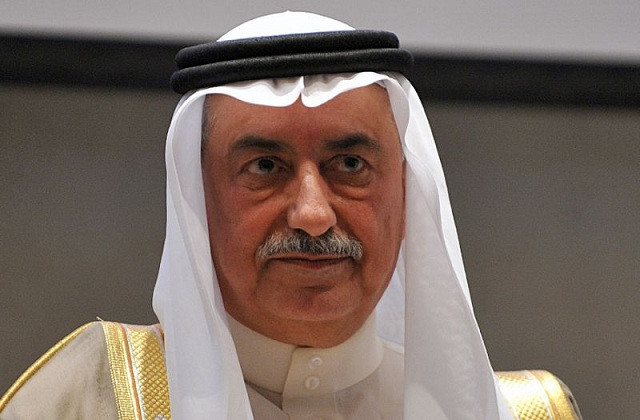Saudi finance minister sacked by royal decree
Assaf, who has a doctorate in economics, was reassigned as a minister of state and will remain in cabinet

Saudi Arabian Finance Minister Ibrahim Al-Assaf attends a 2013 investor conference in Riyadh. PHOTO: AFP
Ibrahim al-Assaf "has been removed from his position", said a royal decree, one of a series of orders from King Salman, published by the official SPA news agency.
Assaf was replaced by Mohammed Aljadaan, head of the Capital Market Authority which regulates the stock market.
A foreign diplomat had told AFP weeks ago there was talk of changing the finance minister, who is 67 years old and had held the post for 20 years.
Saudi prince executed for murder
Assaf, who has a doctorate in economics, was reassigned as a minister of state and will remain in cabinet.
Aljadaan, a lawyer, had led the Capital Market Authority since January last year.
No replacement for him at the market regulator was immediately named.
Since 2014, global oil prices have collapsed by about half, accelerating Saudi efforts to move away from petroleum which still accounts for the bulk of government income.
The world's biggest oil exporter is projecting a budget deficit of $87 billion this year.
It has taken a series of austerity measures, including subsidy cuts, reductions in cabinet ministers' salaries and delays in major projects.
Earlier this year, Deputy Crown Prince Mohammed bin Salman, 31, who heads the main economic coordinating body, announced a wide-ranging plan to move the economy away from oil.
Assaf last week said Saudi Arabia's financial position remains strong despite sinking oil prices, although there is "some pressure" on bank liquidity.
Obama hosts powerful Saudi prince
"We have been able to maintain a good position in public finances," Assaf said.
Among measures to cover the fiscal gap, Riyadh has drawn on its foreign reserves and issued domestic bonds before Assaf, two weeks ago, supervised the kingdom's first international bond offering.
It raised $17.5 billion, reflecting strong global interest.
Official figures show the kingdom's reserves declined to $562 billion in August from $732 billion at the end of 2014.
Oil prices are hovering around $50 per barrel after hitting a 10-year low of less than $30 in January, down from a peak of more than $100 in mid-2014.
The finance portfolio was the only cabinet position changed under the royal decrees which also replaced the heads of several agencies including the Saudi Food and Drug Authority.



















COMMENTS
Comments are moderated and generally will be posted if they are on-topic and not abusive.
For more information, please see our Comments FAQ